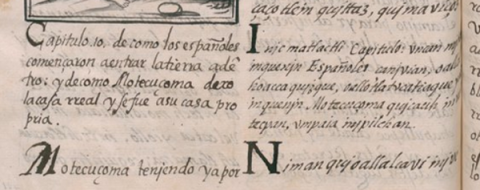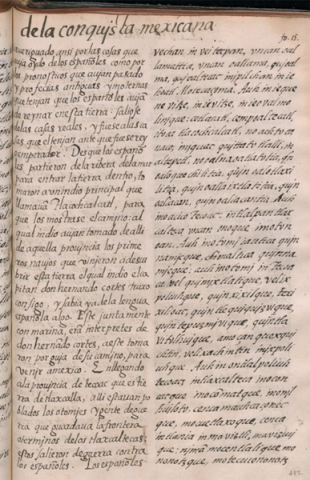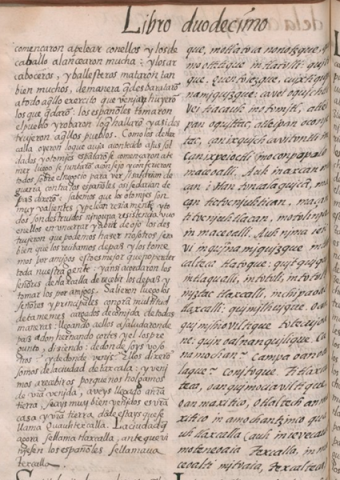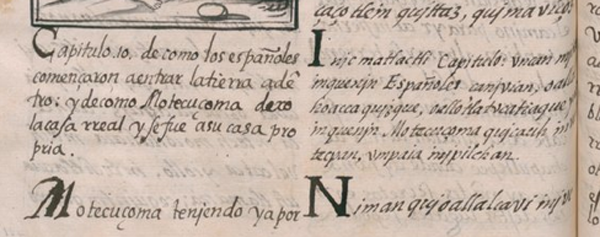 |
[Transcription of the Nahuatl (right-hand column) by James Lockhart:]
[f 14v., cont.] Inic matlactli Capitulo: vncan mitoa in quenin Españoles çan ivian, oallalhoaccaquizque, oallotlatocatiaque yoā in quenin Motecuçoma quicauh in vei tecpan, vmpa ia in ipilchan.
Niman quioallalcavi in ive
|
[Translation of the Nahuatl (right-hand column) by James Lockhart:]
Tenth chapter, where it said how the Spaniards landed uncontested and came on their way in this direction, and how Moteucçoma left the great palace and went to his personal home.
Then Moteucçoma abandoned his patrimonial
[Translation of the Spanish (left-hand column) by James Lockhart:]
Chapter Ten, of how the Spaniards began to go into the interior of the country, and how Moteucçoma left the royal palace and went to his own house.
Moteucçoma, considering because of
|
[Translation of the Nahuatl into Spanish by Fr. Bernardino de Sahagún; transcription of the Spanish (left-hand column) by James Lockhart:]
[f. 14v., cont.] Capitulo. 10. de como los españoles començaron a entrar la tierra adētro: y de como Moteucçina dexo la casa rreal y se fue a su casa propria.
Moteucçoma teniendo ya por
|
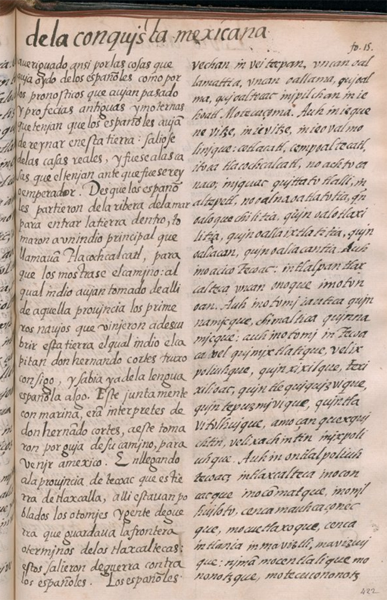 |
[Transcription of the Nahuatl (right-hand column) by James Lockhart:]
[f. 15r.] vechan in vei tecpan, vncan oallamattia, vncan oallama, quioalma, quioaltocac in ipilchan in iehoatl Motecuçoma.
Auh in iequene vitze, in ie vitze, in ie ovalmolinique: ce tlacatl, cempoaltecatl, itoca tlacochcalcatl, no achto canaco; in iquac quittato tlalli, in altepetl, no oalnaoatlatotia, q’noaloquechilitia, quinoalotlaxilitia, quinoallaixtlatitia, quinoaliacan, quinoaliacantia.
Auh in oacico Tecoac: intlalpan tlaxcalteca vncan onoque imotonoan. Auh in otomi iautica quinnamicque, chimaltica quinnamicque: auh in otomi in Tecoaca vel quimixtlatique, vel ixpoliuhque, quinxixilque, texixilioac, quintlequiquizvique, quintepuzmivique, quintlavitolhuique, amo çan quexquichtin, vel ixachintin, in ixpoliuhque.
Auh in ontlalpoliuh Tecoac; in tlaxcalteca in oconcacque in ocōmatique, in onilhuiloto, cenca mauhcaçonecque, mocuetlaxoque, cenca intlan ia in maviztli, mavizcuique: nimā mocentlalique mononotzque, motecuiononotz
|
[Translation of the Nahuatl (right-hand column) by James Lockhart:]
home, the great palace, and came back to his personal home.
When at last [the Spaniards] came, when they were coming along and moving this way, a certain person from Cempoallan, whose name was Tlacochcalcatl, whom they had taken when they first came to see the land and the various altepetl, also came interpreting for them, planning their route, conducting them, showing them the way, leading and guiding them.
And when they reached Tecoac, which is in the land of the Tlaxcalans, where their Otomis lived, the Otomis met them with hostilities and war. But they annihilated the Otomis of Tecoac, who were destroyed completely. They lanced and stabbed them, they shot them with guns, iron bolts, crossbows. Not just a few but a huge number of them were destroyed.
After the great defeat at Tecoac, when the Tlaxcalans heard it and found out about it and it was reported to them, they became limp with fear, they were made faint; fear took hold of them. Then they all assembled, including the lords
[Translation of the Spanish (left-hand column) by James Lockhart:]
the things he had heard about the Spaniards, as well as the prophecies that had been made in ancient and modern times, that the Spaniards were to rule in this land, left the royal palace and went to the house that he had before he was king or emperor.
From the time that the Spaniards left the seacoast to go into the interior of the country, they took a leading Indian named Tlacochcalcatl to show them the way; the first ships that came to discover this land had taken him from that province; Captain don Hernando Cortés brought this Indian along with him, and he already knew something of the Spanish language. He was an interpreter for don Hernando Cortés along with Marina, and he was the one they took to guide the way coming to Mexico.
When they reached the province of Tecoac, which is Tlaxcalan territory, they found settled there the Otomis and warriors who guarded the border or jurisdictional limits of the Tlaxcalans, and they came out to do battle against the Spaniards.
The Spaniards
|
[Translation of the Nahuatl into Spanish by Fr. Bernardino de Sahagún; transcription of the Spanish (left-hand column) by James Lockhart:]
[f. 15r.] aueriguado ansi por las cosas que auia oydo de los españoles como por los pronosticos que auian pasado y profecias antiguas y moternas que tenian que los españoles auiā de reynar en esta tierra: saliose de las casas reales, y fuese a las casas que el tenian ante que fuese rey o emperador.
Desque los españoles partieron de la ribera de la mar para entrar la tierra dentro, tomaron a vn indio principal que llamauā Tlacochcalcatl, para que los mostrase el camino: al qual indio auian tomado de alli de aquella prouincia los primeros nauios que vinieron a descubrir esta teirra el qual indio el capitan don hernando cortes truxo consigo, y sabia ya de la lengua española algo. Este juntamente con marina, erā interpretes de don hernādo cortes, a este tomaron por guia de su camino, para venir a mexico.
En llegando a la prouincia de tecoac que es tierra de tlaxcalla, alli estauan poblados los otomies y gente de guerra que guardaua la frontera o terminos de los tlaxcaltecas: estos salieron de guerra contra los españoles. Los españoles
|
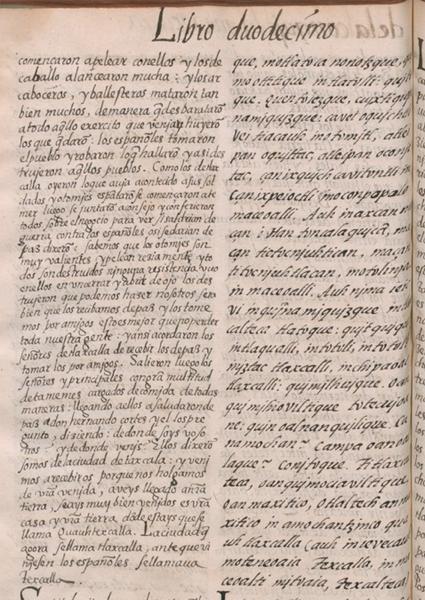 |
[Transcription of the Nahuatl (right-hand column) by James Lockhart:]
[f. 15v.] que, motlatocanonotzque, quimoottitique in tlatolli:
quitoque. Quen toiezque, cuix tiquinnamiquizque: cavei oquichtli vei tiacauh in otomitl, atle ipan oquittac, atle ipan oconittac, çan ixquich cavitontli in çan ixpeioctli in oconpopolo maceoalli. Auh in axcan ma çan itlan toncalaquicā, ma çan tictocniuhtican, ma çan titocniuhtlacan, motolinia in maceoalli.
Auh nima ie ic vi in quīnamiquizque in tlaxcaltecatlatoque: quitquique in tlaqualli, in totoli, in totoltetl iniztac tlaxcalli, in chipaoac tlaxcalli: quimilhuique. Oanquimihioviltique totecuioane:
quinoalnanquilique. Can amochan? Campa oanoallaque?
Conitoque. Titlaxcalteca, oanquimociaviltique, oan-maxitico, otlaltech anmaxitico in amochantzinco quauh-tlaxcalla*
(auh in ie vecauh moteneoaia Texcalla, in maceoalti mitoaia, Texcalteca.)
----------
*QUAUHTLAXCALLA. The form contains a prefatory quauh-, sometimes seen optionally combined with altepetl names on formal occasions. I am not sure whether the element derives from quahuitl 'tree, wood, forest', in which case it might have a connotation of mock humiltiy, or from quauhtli 'eagle', in which case it would connote pride and martial vigor.
|
[Translation of the Nahuatl (right-hand column) by James Lockhart:]
and rulers, and took counsel among themselves, considering the reports.
They said, “How is it to be with us? Should we face them? For the Otomis are great and valiant warriors, yet they thought nothing of them, they regarded them as nothing; in a very short time, in the blink of an eyelid,they destroyed the people. Now let us just submit to them, let us make friends with them, let us be friends, for something must be done about the common people.”
Thereupon the Tlaxcalan rulers went to meet them, taking along food: turkey hens, eggs, white tortillas, fine tortillas. They said to them, “Welcome, our lords.”
[The Spaniards] answered them back, “Where is your homeland? Where have you come from?”
They said, “We are Tlaxcalans. Welcome, you have arrived, you have reached the land of Tlaxcala, which is your home.”
(But in olden times it was called Texcallan and the people Texcalans).
[Translation of the Spanish (left-hand column) by James Lockhart:]
began to fight with them; the horsemen lanced many of them, and the harquebusiers and crossbowmen also killed many, so that they routed the whole army that was coming, and those who remained fled. The Spaniards took the settlement and stole what they found, and so they destroyed those settlements.
When the Tlaxcalans heard what had happened to their soldiers and Otomis, they were shocked and began to be afraid. Then they assembled in council and all conferred about the matter, to see if they should do battle against the Spaniards or if they should submit peacefully.
They said, "We know that the Otomis are very valiant and fierce fighters, yet all have been destroyed. They were unable to resist them; in the blink of an eyelid they destroyed them. What can we do? It will be well to receive them peacefully and take them as friends. That would be better than losing all our people." And so the lords of Tlaxcala agreed to receive them peacefully and take them as friends.
Then the lords and leaders went out with a great multitude of tamemes [bearers] loaded with all kinds of food. Reaching them, they greeted don Hernando Cortés peacefully.
He asked them, "Where are you from? Where do you come from?"
They said, "We are from the city of Tlaxcala, and we are coming to receive you because we are glad that you have come. You have reached our land; you are very welcome; this land where you are, which is called Quauhtexcallan, is your home and land."
Today the city is called Tlaxcala, but before the Spaniards came it was called Texcallan.
|
[Translation of the Nahuatl into Spanish by Fr. Bernardino de Sahagún; transcription of the Spanish (left-hand column) by James Lockhart:]
[f. 15v.] començaron a pelear con ellos y los de caballo alancearon mucha: y los arcaboceros, y ballesteros mataron tanbien muchos, de manera q̄ desbaratarō a todo aq̄llo exercito que venia huyerō los que q̄daron: los españoles tomaron el pueblo y robaron lo q̄ hallarō y asi destruieron aq̄llos pueblos.
Como los de tlaxcalla oyeron lo que auia acontecido a sus soldados y otomies espātaronse començaron a temer luego se juntarō a consejo y conferieron todos sobre el negocio para ver si saldrian de guerra contra los españoles o si se darian de paz
dixerō: sabemos que los otomies son muy valientes y pelean reziamente y todos son destruidos ninguna resistencia vuo en ellos en vn cerrar y abrir de ojo los destruieron que podemos hazer nosotros sera bien que los recibamos de paz y los tomemos por amigos esto es mejor que no perder toda nuestra gente: y ansi acordaron los señores de tlaxcalla de recebirlos de paz y tomarlos por amigos.
Salieron luego los señores y principales con grā multitud de tamemes cargados de comida de todas maneras: llegando a ellos asaludaron de paz a don hernando cortes
y el los pregunto, diziendo: de donde soys vosotros? y de donde venis?
Ellos dixerō somos de la ciudad de taxcala: y venimos a recebiros porque nos holgamos de v̄r̄a venida, aveys llegado a n̄r̄a tierra, seays muy bienvenidos es v̄r̄a casa y v̄r̄a tierra dōde estays que se llama Quauhtexcalla.*
La ciudad q̄ agora se llama tlaxcalla, ante que vinieson los españoles se llamaua texcalla.
----------
*QUAUHTEXCALLAN. The Spanish version takes quauh- as part of the name, which it is not, and has "-texcalla" rather than "-tlaxcalla" as in the Nahuatl; see n. 51 just above.
|
